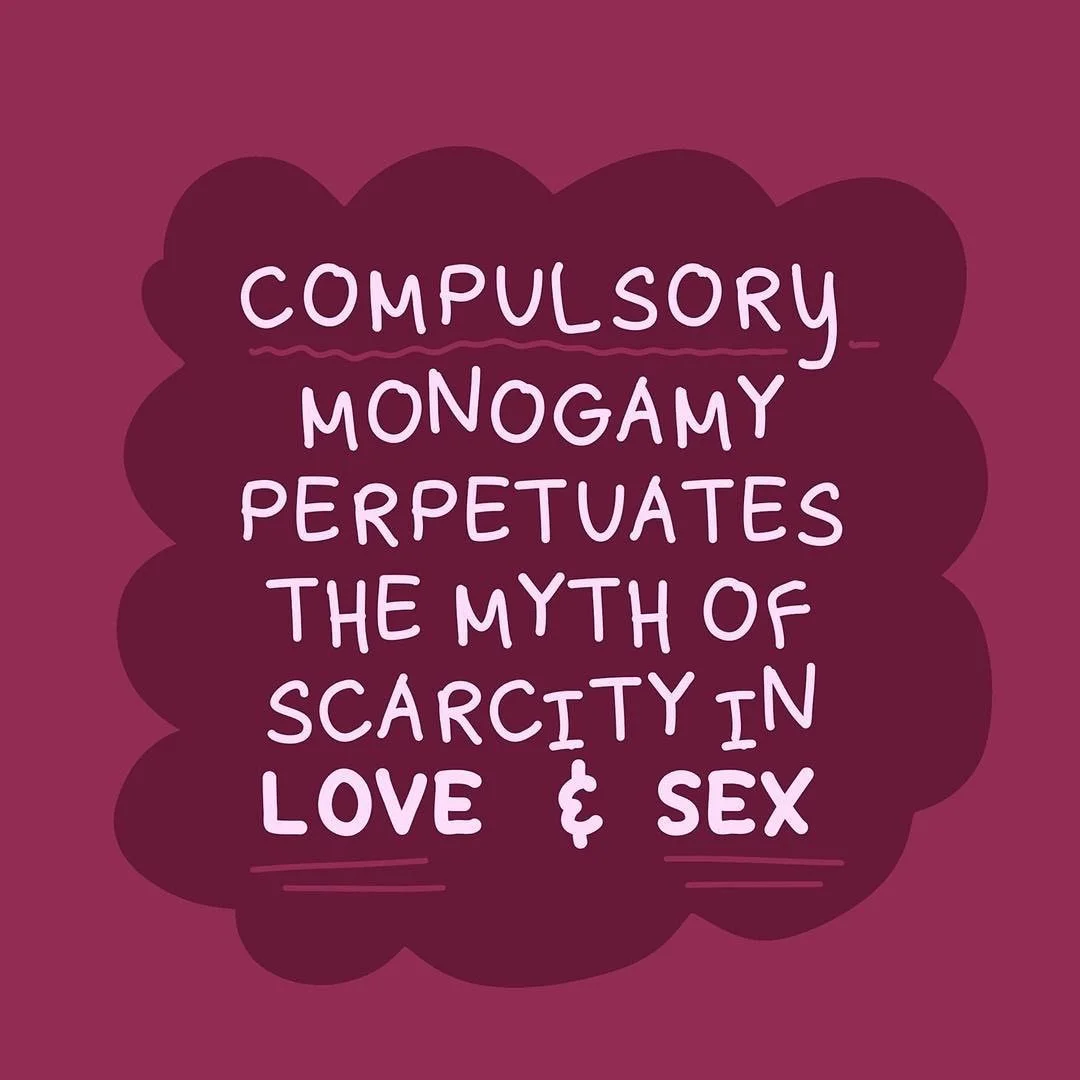Antidotes For Toxic Monogamy
It’s no secret that polyam does not work under compulsory monogamous standards. Unfortunately, toxic monogamy is all around us! From our favorite romcoms that glorify possessiveness and competition to dating advice that assures you that you’ll find THE ONE, to well-meaning friends who patronizingly inform you that your non-monogamous relationship won’t last. It takes time to let go of all that shit. Last week, in our ENM course, we dived deep into unpacking toxic compmono myths. But if you missed the chapter, here’s a quick summary of toxic compmono’s three main destructive roots:
Ownership: The idea that you“own” your partner and they “own” you as a result of exclusivity. It becomes hard to see humans as autonomous. This leads to jealousy, codependency, coveting, territoriality, competition, etc.
Perfectionism: The idea that the perfect person for you must fulfill all your needs and you must fulfill all of theirs. It becomes hard to see humans as having limitations. This leads to unrealistic expectations, resentment, and disappointment.
Inflexibility: The idea that there’s only one “correct” way to exist in relationships that follows the compulsory monogamous script (often called the RELATIONSHIP ESCALATOR). Inflexibility also shows up in the belief that adhering to compmono scripts guarantees relationship success without further effort. It becomes hard to see relationships other than exclusive romantic heterosexual relationships as valid. This can lead to feeling alienated, pigeonholed, stuck, and dissatisfied.
It's nearly impossible to sustain ethical non-monogamy long-term if you're unable to let go of the toxic compmono destructive roots. Fortunately, each one of those destructive roots has an antidote that you can foster in yourself and your polycule. A large portion of this book dives into complex ways to embrace these antidotes, but first, familiarize yourself with them:
Trust: Rather than trying to control each other based on the belief of ownership, I suggest cultivating trust in each other to make decisions that nurture sustainable wellness and challenge growth. Developing Trust requires the following foundational skills: recognition of autonomy, building robust integrity, commitment to radical honesty, developing non-violent communication skills, having a grasp on BAES
Acceptance: Rather than expecting your pals to be perfect or breaking under the pressure to be perfect in every way for your pals, I suggest fostering acceptance for each other’s authentic selves. Developing Acceptance requires seeing yourself and your pals for who y’all are rather than trying to change each other. Recognizing how to nurture the good parts of your individual selves and fostering the parts y’all have chosen to grow while letting go of unrealistic expectations.
Flexibility: Rather than assuming there is only one way to practice relationships or seeing relationships as fundamentally flawed if they fail to follow compmono script, embrace the possibility that individuals have different preferences, and through flexibility, we can extend ourselves to find new solutions that best sustain wellness.
Understanding the antidotes for toxic monogamy can give you some direction on how to initially embrace polyam when you first open your relationship. These skills obviously aren’t developed overnight but instead are tools that will get easier and more natural with practice. Alone, they don’t solve all of your problems but rather are meant to be pillars for how to problem-solve through situations in a spirit of teamwork and respect. When you’re feeling stuck, I recommend revisiting these principles and seeing how they can help you work through issues.
I hope we got your juices flowing. As always, we aim to provide as much free and accessible content as possible; thanks to the amazing support of our patrons. Head over to our Patreon to support our work and get access to bonus content! If you have any questions or want to chat, please book a peer support session.

